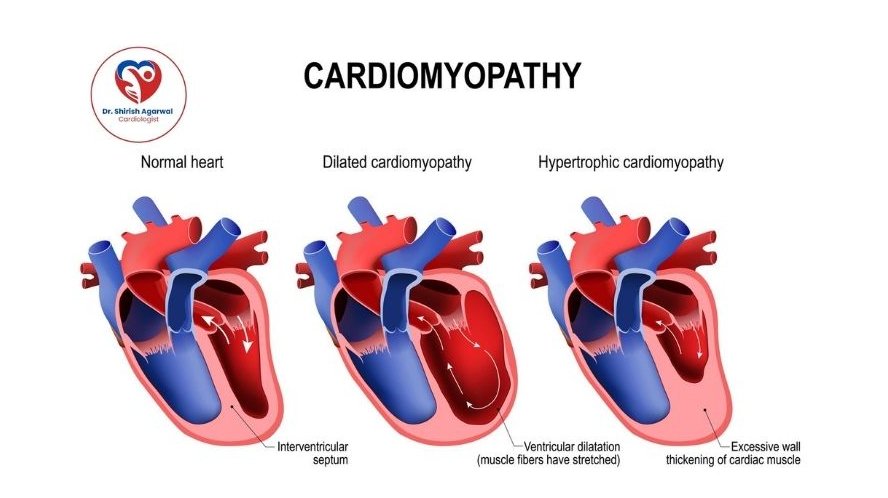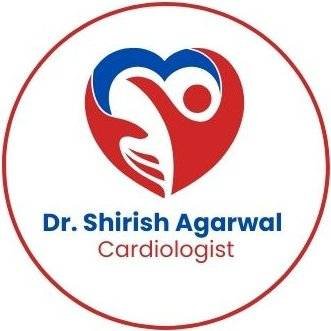Cardiomyopathy

What is Cardiomyopathy?
Cardiomyopathy refers to conditions affecting the heart muscle, leading to enlargement, thickening, or rigidity of the heart. In some cases, the muscle tissue is replaced with scar tissue. This condition can lead to heart failure or arrhythmias, affecting the heart’s ability to pump blood effectively. Dr. Shirish Agarwal, the best cardiologist in Indore, offers expert care and cardiomyopathy treatment in Indore, providing comprehensive solutions to manage this condition.
Symptoms of Cardiomyopathy
Shortness of Breath
Consequently, difficulty breathing, especially during physical exertion or while lying down, is common as the heart struggles to pump blood efficiently.
Fatigue
Moreover, persistent tiredness and weakness occur because the heart cannot pump enough blood to meet the body's needs.
Swelling
Additionally, edema, or swelling in the legs, ankles, feet, and abdomen, can happen due to fluid buildup caused by poor heart function.
Chest Pain
Furthermore, some patients may experience chest discomfort or pain, particularly during physical activity or stress.
Dizziness or Fainting
As a result, lightheadedness or fainting can occur from irregular heartbeats or insufficient blood flow to the brain.
Palpitations
Finally, irregular heartbeats or fluttering sensations in the chest may be noticeable due to arrhythmias.
Causes of Cardiomyopathy
Genetic Factors
Firstly, inherited conditions can cause this, with family history playing a significant role in the disease's development.
Chronic High Blood Pressure
Secondly, long-term high blood pressure can lead to an enlarged and weakened heart muscle.
Heart Attacks
Moreover, damage from heart attacks can scar heart tissue and lead to cardiomyopathy.
Alcohol and Drug Abuse
Additionally, excessive alcohol consumption and the use of certain drugs can damage the heart muscle over time.
Infections
Furthermore, viral infections that affect the heart muscle, such as myocarditis, can cause cardiomyopathy.
Nutritional Deficiencies
Lastly, a lack of essential nutrients like thiamine can affect heart muscle function.
Benefits of Treatment
Improved Heart Function
Treatments can help enhance the heart's pumping ability, alleviating symptoms and improving overall cardiac health.
Symptom Relief
Effective management of cardiomyopathy can reduce symptoms like breathlessness, fatigue, and swelling, improving quality of life.
Reduced Complications
Proper treatment lowers the risk of severe complications such as heart failure, arrhythmias, and sudden cardiac arrest.
Enhanced Exercise Capacity
Patients often regain the ability to engage in physical activities with less discomfort and fatigue.
Dr. Shirish Agarwal, the best cardiologist in Indore, offers expert care and cardiomyopathy treatment in Indore, ensuring patients experience significant benefits from tailored treatment plans.
Preparation for Treatment
Comprehensive Medical Evaluation
To begin with, a thorough assessment, including medical history, physical examination, and diagnostic tests like ECG, echocardiogram, and MRI, is conducted to understand the condition’s extent.
Lifestyle Assessment
In addition, reviewing the patient's lifestyle habits, including diet, exercise, and substance use, helps in planning effective treatment strategies
Medication Review
Furthermore, Dr. Shirish Agarwal will evaluate current medications to adjust or prescribe new ones that better manage symptoms and improve heart function.
Patient Education
Lastly, educating patients about cardiomyopathy, its implications, and treatment options ensures they are well-informed and prepared for their treatment journey.
Dr. Shirish Agarwal, the best cardiologist in Indore, offers expert care and cardiomyopathy treatment in Indore, providing comprehensive preparation to ensure effective management.
Treatment of Cardiomyopathy
Medications
Drugs such as beta-blockers, ACE inhibitors, diuretics, and anti-arrhythmic medications are used to manage symptoms, improve heart function, and prevent complications.
Lifestyle Modifications
Changes in diet, regular exercise, quitting smoking, and limiting alcohol intake are recommended to support heart health.
Implantable Devices
Devices like pacemakers, ICDs, and CRTs may be implanted to help manage arrhythmias and improve heart function.
Surgery
In severe cases, surgical options like septal myectomy or heart transplantation may be necessary.
Dr. Shirish Agarwal, the best cardiologist in Indore, offers expert care and cardiomyopathy treatment in Indore, utilizing a range of treatment options to best address the condition.
Recovery
Ongoing Monitoring
Regular follow-up appointments to monitor heart function and adjust treatments as needed are crucial for long-term management.
Cardiac Rehabilitation
Structured exercise programs and lifestyle education to help patients recover and maintain heart health.
Medication Adherence
Regularly taking prescribed medications and adhering to medical advice to manage symptoms and prevent worsening of the condition.
Support Systems
Engaging with support groups, counseling, and family support to cope with the emotional and psychological impacts of cardiomyopathy.
Dr. Shirish Agarwal, the best cardiologist in Indore, offers expert care and cardiomyopathy treatment in Indore, ensuring comprehensive support during the recovery phase.
Conclusion
It is a serious condition affecting the heart muscle, leading to symptoms like shortness of breath, fatigue, and arrhythmias. Effective management and treatment, including medications, lifestyle changes, and possibly surgical interventions, can significantly improve outcomes. Dr. Shirish Agarwal, the best cardiologist in Indore, offers expert care and cardiomyopathy treatment in Indore, providing tailored and comprehensive care to ensure optimal heart health and quality of life for his patients.
Frequently Asked Questions
Cardiomyopathy is a disease of the heart muscle that affects its size, shape, and structure, leading to difficulties in pumping blood efficiently. Dr. Shirish Agarwal, the best cardiologist in Indore, explains that there are different types of cardiomyopathy, including dilated, hypertrophic, and restrictive, each with unique characteristics and impacts on heart function.
Common symptoms of cardiomyopathy include shortness of breath, fatigue, swelling in the legs and ankles, and irregular heartbeats. Dr. Shirish Agarwal, the leading cardiologist in Indore, emphasizes the importance of recognizing these symptoms early and seeking medical attention to prevent the condition from worsening.
Cardiomyopathy can be caused by a variety of factors, including genetic conditions, long-term high blood pressure, heart valve problems, and chronic alcohol use. Dr. Shirish Agarwal, known for his expertise in Indore, notes that understanding the underlying causes is crucial for developing an effective treatment plan tailored to each patient.
Diagnosis of cardiomyopathy typically involves a combination of medical history review, physical examination, and diagnostic tests such as echocardiograms, MRIs, and blood tests. Dr. Shirish Agarwal, the best cardiologist in Indore, uses advanced diagnostic tools to accurately identify the type and severity of cardiomyopathy, ensuring precise and effective treatment.
Treatment options for cardiomyopathy include lifestyle changes, medications, implanted devices like pacemakers or defibrillators, and in severe cases, surgery or heart transplantation. Dr. Shirish Agarwal, the top cardiologist in Indore, provides comprehensive care and personalized treatment plans to help manage symptoms and improve heart function.
While some forms of cardiomyopathy cannot be prevented, adopting a heart-healthy lifestyle can reduce the risk of developing the condition. Dr. Shirish Agarwal, the best cardiologist in Indore, advises maintaining a balanced diet, regular exercise, avoiding excessive alcohol, and managing stress as effective strategies to support heart health and potentially prevent cardiomyopathy.
For any concerns or symptoms related to cardiomyopathy, consulting with Dr. Shirish Agarwal, the best cardiologist in Indore, can provide the necessary guidance and treatment to manage the condition effectively.
